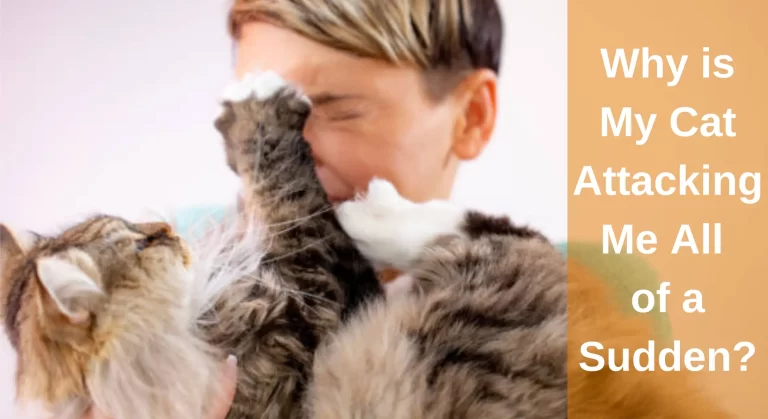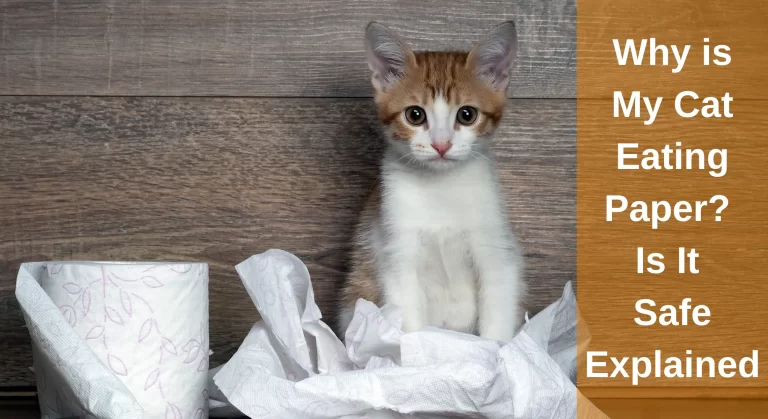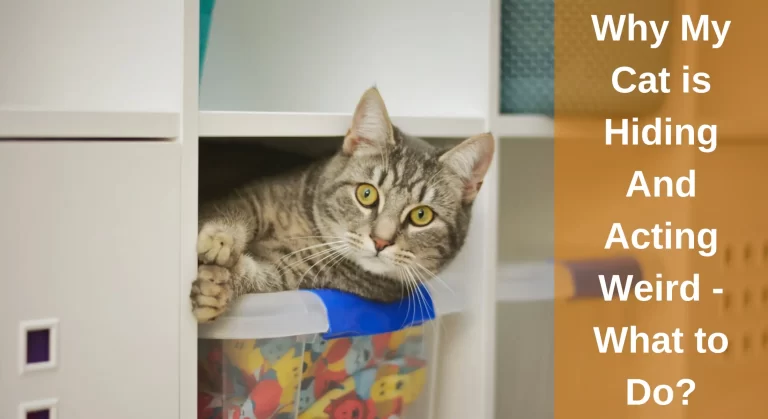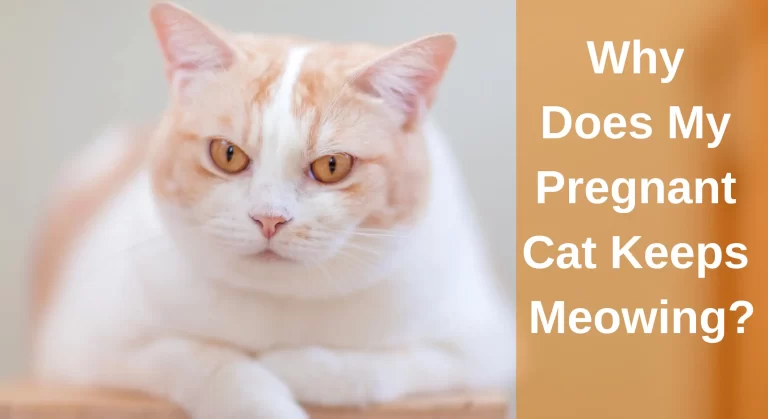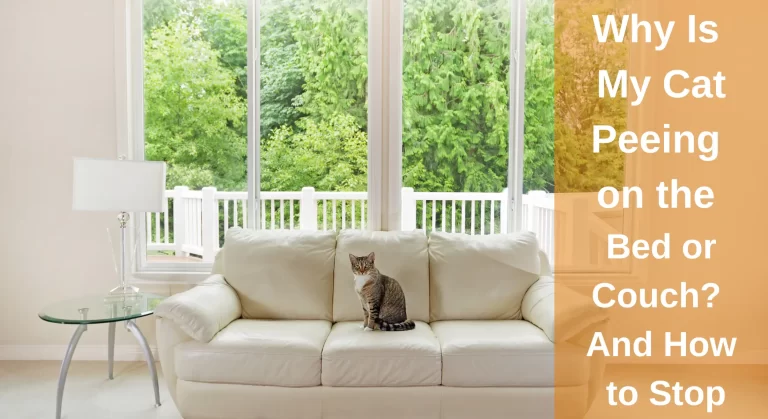Why Are Male Cats Around Pregnant Female Cats? [Answered]
At the age of 4 months, felines become sexually mature and can reproduce. Hence, it is recommended that you must neuter your feline to avoid unplanned pregnancies. Moreover, if you don’t neuter your cat, you may have seen your intact male cat chasing your pregnant feline. Most of you might get confused about these cats’ behaviors and ask why male felines do this.
Male cats can exhibit mating behavior towards pregnant female cats due to their natural instincts, driven by hormonal changes and the female’s scent. However, a cat cannot get pregnant while already pregnant, as their body releases hormones that prevent further ovulation. During pregnancy, a female cat’s interest in mating typically diminishes, and she may display signs of aggression or avoidance toward males.
In this article, we will explore the topic of male cats around pregnant female cats, discussing their behavior, potential risks, and ways to create a safe and stress-free environment during this delicate time.
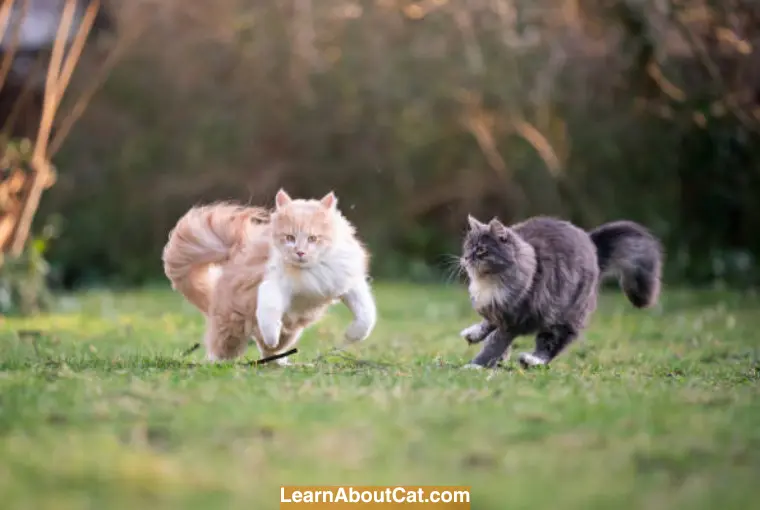
Do Pregnant Cats Attract Male Cats?
Absolutely, because of the production of pheromones and behavioral changes throughout pregnancy, pregnant felines can draw male felines. The pheromones that females produce for telling male felines that they’re fertile and willing to mate are powerful during the pregnancy period.
Moreover, pregnant felines act in a different way than normal cats, that’s why they may appear attractive to male felines. Moreover, pregnant cats are less nervous and violent, than non-pregnant ones, so male cats find them easy prey for mating.
However, it’s crucial to remember, that letting a pregnant feline to undergoes sexual contact with a male feline may cause significant health concerns for both felines.
Also Read: Cat Lethargic 3 Days After Spay: Is It Normal? Things Cat Owners Should Know
What to Do to Get Male Cat Leave a Pregnant Cat? How Do You Stop a Male Cat from Attacking a Female Cat?
Here are some steps you may do to prevent your male feline from harming the female feline who is expecting:

1. Creating a Safe and Relaxing Space
First and foremost, provide her with a designated area where she can relax undisturbed by the male cat’s advances. This dedicated space will alleviate his urge to mate with her while she is carrying kittens and in need of rest. This space should be cozy, comfortable, and free from any potential disturbances. Ensure that this space is off-limits to the male cat.
2. Separating the Male Cat When Needed
Another effective approach is to separate the male cat into a different room whenever the pregnant cat requires solitude. This will convey the message to the male cat that he should give her ample space during these crucial moments.
Provide each feline with its separate resources. By locating numerous, similar cat couches, food bowls, and litter trays in various locations throughout your house, you can lessen cat conflict.
3. Neutering as a Solution
If the male cat continues to display aggressive behavior towards females, even after implementing the above tactics, it might be necessary to consider neutering him. By neutering the male cat, you can significantly decrease his aggressive behavior, making him less likely to bother the pregnant cat or any other female cat in the future. It’s important to remember that neutering should be approached as a long-term solution to behavioral issues and should be carried out by a qualified veterinarian.
4. Visit The Vet for Underline Illness
Always visit your vet for a thorough health evaluation if your cat’s behavior changes unexpectedly. Cats usually delay showing signs of illness until they become seriously ill. Any alteration in behavior might be a first indication of a health problem.
5. Behavior Modification Program
In extreme cases, talk to your vet about giving pills to your felines and start a behavior modification program. The only person qualified and licensed to give your felines medicine is your vet. Before even consulting your vet, never give your feline any other prescribed medication.
It’s possible that pets don’t react to medicines in the identical way that people do, and a pet may die from prescriptions that are suitable for humans. Keep in mind that medicine shouldn’t be used as a stand-alone treatment and only in combination with behavior modification.
Check Out: Why Do Mother Cats Attack Their Older Kittens?
6. Use Spray Bottle
Never let the cats engage in combat. Cat fights do not resolve issues and usually make them worse. Use a water spray bottle or a loud handclap to stop them from fighting.
7. Use Pheromones
Another alternative is pheromones. To lessen tension, you can purchase a substance that mimics a cat’s normal odor, which humans are unable to smell. You can also use a diffuser to lessen aggression issues.
8. Reward Positive Behavior
Activate positive behavior. Compliment or give treats to your felines when you notice them behaving nicely towards one another.
Find Out: Cat Not Eating After Spay: Reasons Cat Owners Should Know
Why is My Male Cat Attacking My Pregnant Female Cat? Reasons
Male felines are harmful to expected felines. Moreover, they may become more violent than normal being pregnant. They frequently attempt to attack or claw their expected female cats. Listed below are a few explanations for your male feline’s hostile behavior against your pregnant feline.

Male-on-Male Violence
Older male cats frequently harass and sometimes fight with pregnant cats. These actions might be performed to sexually threaten females or to move up the superficially structured social superiority of male felines.
This type of aggression involves a lot of formalized body postures, chasing, gazing, meowing, and yelling. Disputes are often prevented if one cat quits and goes away. Although felines rarely impose major injury on each other, you must look for any stab marks that might get infected. Male cats who have not undergone neutering are much more prone than non-neutered males to engage in such combat.
Defense-Induced Violence
Maternal hostility in pregnant women is common. A female feline having lots of kittens may shriek, growl, chase, claw, or bite other felines if they approach its kittens; even if they’re friendly. Usually, mother aggression lessens after the kittens are nursed. Spaying maternally hostile cats is a smart approach to prevent further litter and aggressiveness problems.
A male feline will respond aggressively in an attempt to protect itself if he believes he can’t escape an attack. This could be a consequence of being punished or threatened with punishment, being attacked or tried to be attacked by another feline, or any time he becomes terrified.
Protective postures include squatting with the legs crossed underneath the body, dropping the ears backward, curling the tail, and sometimes turning just a bit in one direction. If you follow a feline in this situation, it will probably bite you.
Redirected Violence
This type of aggression is directed at an animal other than the one who first initiated the behavior. For example, a domestic cat gazing at a window might see an outdoor cat moving through the front lawn.
He can’t fight the outside cat, so he might go and fight the other cat in your home which is beside him no matter if she’s pregnant or not. Anger that has been redirected may manifest as an assault or a defense.
Territory
Male cats are violent creatures that actively engage in combat to defend the region they view as their domain. The majority of the time, this happens while male felines fight outside the house since your pet believes the pregnant female feline has invaded their space. A domestic cat, on the other hand, might believe that your feline has no right to be in this area. But felines that stay together also frequently have these disputes.
Cats use smell to define their domain, and your house isn’t an exception. This is a frequent source of dispute among cats, especially if you have several of them residing in your house.
Playtime
Things may get violent when felines are playing. Although felines can be harsh during play, this isn’t the same as aggression or combat. But, this playing might cause a fight or injure both felines. In such situations, it is advised to separate your felines securely. Male felines and expected felines often engage in harsh, furious play since all feline playtime includes faux aggression.
Aggressive behavior can be reduced by using cat-appealing pheromone items, like mists to put on furnishings or diffusers, to help reduce anxious emotions. These techniques can be applied to decrease any aggression in a home with numerous cats or to make the arrival of a new feline easier.
Do Male Cats Know When Female Cats Are Pregnant?
Male cats can exhibit some awareness or recognition of female cats being pregnant, primarily through their sense of smell. Female cats emit pheromones and hormonal changes occur during pregnancy, which can be detected by male cats. This may result in changes in male cat behavior, such as increased curiosity or attention toward the pregnant female
In order to let the male feline, know they are prepared for mating, female felines release pheromones if they’re in heat. These pheromones have a particular aroma.
Check out: Can A Cat Get Pregnant While Nursing?
Male Trying to Mate With Pregnant Cat? Can Male Cat Mate With Already Pregnant Cats?
If a female feline is expecting, she doesn’t experience heat, so the likelihood of a male feline attempting to mate with her is lower. Male cats may rapidly identify the fragrance that female felines attempt to produce during the heat cycle. Even though, when a feline is expecting, the male cat may sometimes try to mate with her, she rejects them and doesn’t accept his proposals.
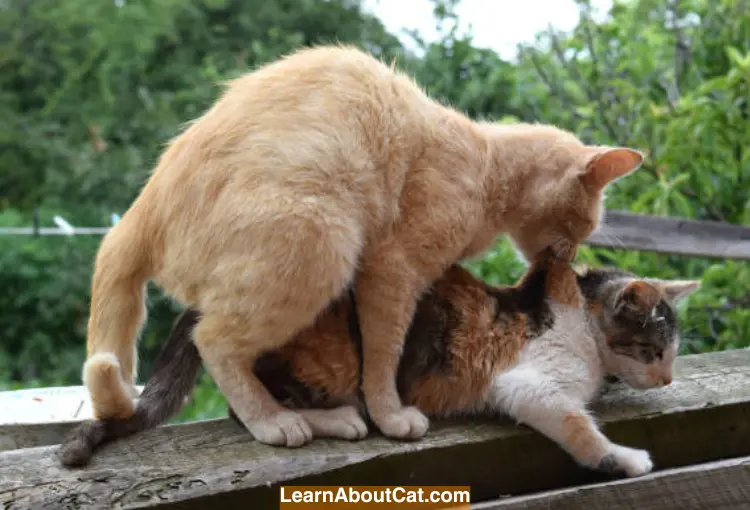
However, if a male cat mates with an already pregnant feline it may be due to she’s producing sexual hormones or may experiencing a heating cycle. Moreover, when it occurs, they may draw a male feline and reproduce with them; occasionally, this results in them having two litters.
Although it is not advised, a male feline can attempt to mate with expectant females. A female feline shouldn’t mate with other male felines after she becomes pregnant because this can cause difficulties and health problems for the female and her future offspring.
Diseases, wounds, and other health issues can become more likely in the female cat after coupling while she is expecting. Moreover, stress might result in delivery difficulties or even spontaneous abortion. In order to maintain the health and well-being of pregnant felines, it is crucial to separate male felines from them.
Also, Check Out: Signs of Infection After Neutering Cat: How to Care and Help
Do Cats Get Aggressive Towards Other Cats When Pregnant?
When pregnant, female felines can exhibit increased aggression against other felines. This is due to hormonal fluctuations brought on by conception may have an impact on the behavior of the cat. A pregnant female feline could grow more possessive of her delivery location and her newborn kitties even if the pregnancy goes on.

It’s crucial to remember that every feline is unique, and some could behave more aggressively than others while pregnant. Some felines may also develop stronger attachments to their caretakers and demand more of it.
If you live with more than one cat, it’s crucial to keep an eye on how they get along and behave when a female feline is pregnant.
Should I Separate My Pregnant Cat from Other Cats?
It makes more sense to keep other cats and the pregnant female apart. Other cats including a male in your house are violent and territorial, and they exhibit these traits even when playing, which may be harmful to the pregnant cat.
Also, due to the hormones generated during conception having a scent that is identical to that of a female experiencing heat, may cause other male cats to mate with your pregnant cat. If accidentally a tom cat approaches and mates with the pregnant cat this will labor and result in a premature delivery, which might result in the death of the kittens.
You must separate other cats and pregnant cats not only before delivery but also right after the delivery because the female felines experience heat very quickly after childbirth, which might result in another conception within a very short time.
Especially, male cats want to grab the attention of female cats. The kittens might make them feel frightened and envious, and if they prevent them from sexual contact with the female, they might even harm the kitties. Male felines must therefore be kept apart and away from one another for the safety of the kitties and the mama cat.
Interesting Reading: Where Should Kittens Sleep at Night?
How Do Male Cats Act When A Female Cat Is Pregnant?
Following are some aggressive male cats’ behaviors during pregnancy:

Hissing
The cat’s version of the phrase “leave me.” A cat that hisses does not feel protected at the moment. A hissing feline will likely attack if it keeps feeling frightened and is left with no choice because this is a protective vocalization. Persistent hissing tells the cat owner to take their time when trying to introduce cats. Nowadays, hissing may denote dominance, annoyance, wrath, terror, a threat, dissatisfaction, enjoyment, or any of these emotions. A cat that produces this protective cry will elevate its tail and flash its fangs at the same moment.
Growling
Another vocalization of defense indicates the cat is really scared and uneasy. The cat growls to signal another male it doesn’t like him being there or to inform a female he’s prepared for mating.
Swatting
A cat attempts to distance itself from another animal through protective behavior. This most probably occurs during territorial disputes or when more males are fighting for one female’s affection.
Biting
Felines only use this as a final measure and only in cases where there is no other way to safeguard the female and unborn children. For guidance on effective strategies to teach your feline not to attack humans or other pets, speak with a qualified cat behaviorist. However, if this is not resolved, biting may persist even when the kittens are nursed from the mother cat.
Gazing and Pursuing
The environment has a significant impact on this behavior. Territorial disputes may be the reason for chasing, but it may also be happy behavior.
Why Does My Male Cat Keep Mounting My Pregnant Female Cat?
Mounting behavior in male cats around pregnant females is a common occurrence. It is a display of dominance and an attempt to assert control over the female. This behavior is driven by the male cat’s natural instincts and hormones.
While mounting itself is not necessarily harmful, it can cause discomfort and stress to the pregnant female cat. Excessive mounting may lead to physical injuries or complications in her pregnancy. It is essential to intervene and discourage this behavior by redirecting the male cat’s attention and providing appropriate outlets for his energy.
Additionally, consult with a veterinarian to ensure that there are no underlying medical issues causing the mounting behavior. They can provide further guidance on managing the situation effectively.
Frequently Asked Questions
Can a cat get pregnant while already pregnant?
No, a cat cannot get pregnant while already pregnant. Once a female cat becomes pregnant, her body releases hormones that prevent further ovulation. This mechanism ensures that the cat can focus on nurturing and delivering the current litter without the added burden of another pregnancy. The occurrence of superfetation, where a cat conceives a second litter while carrying a first one, is extremely rare in cats.
Do male cats hurt baby kittens?
Male felines become violent or feel offended and injure young kittens. But male cats don’t always respond in this way; some of them are quite caring and possessive of kittens. It only happens when he is the father of the kitties.
Should I separate my pregnant cat from the male?
It is a good decision to separate your pregnant cat from male ones, as the male cats are violent and territorial while playing and may harm female cats. Moreover, the pheromones produced during conception produce a similar smell to heating hormones. So, these pheromones may urge the male cat to mate with a female cat which causes delivery complications and miscarriage.
Is it safe to have a male cat around newborn kittens?
In most cases, male cats are safe to be near young kittens, but it might also rely on the personality and behavior of the individual cat. Although some male felines may treat kittens as strangers and act violently, others are kind and even caring of them. It’s crucial to monitor relationships among adult male felines and young kittens and separate them if you detect any aggressiveness or threat.
Do cats fight before mating?
Cats rarely fight before mating, although they can display aggression during mating. Also, if the male feline isn’t neutered and the female isn’t ready to mate then he may fight for mating. Moreover, if the male cat feels threatened by the female feline, he may also become aggressive and fight with her.
Do male cats hang around after mating?
In general, male felines do not linger following mating since their innate desire is to engage with other felines. The male feline may go away right away or after a short time when mating is over. The male feline may occasionally remain close to the female feline for some time after mating to protect the female feline and keep other felines away from her.
Male cat won’t leave the pregnant female alone?
If the male feline isn’t neutered, then he’ll continuously chase and try to mate with a pregnant female because of the hormonal imbalances in a female body during conception. Moreover, male cats may don’t leave female felines because of their innate need to reproduce. Also, if the tom cat has already mated with the same female cat who is pregnant, he will chase her to do so once more.
How do I stop my male cat from dominating a female cat?
There are numerous actions you may take to resolve the behavior if a male feline in your home is overpowering a female feline:
1. Neutering can lessen the violent and competitive attitudes of male cats.
2. Separate sleeping quarters, food/water bowls, and litter trays of both felines to reduce stress and prevent the tomcat from competing.
3. Give male cats enough playing and exercising activities to relieve tension and hostility.
4. Treat the cats with goodies or applause when they engage in a peaceful, non-aggressive manner.
Consult a vet or an expert in animal behavior if the behavior persists despite your best efforts.
Wrap Up
Finally, you’ve gained enough knowledge regarding male cats’ behavior towards female felines. No matter whether your female cat is pregnant she still produces the hormones having a smell that indicates she’s in heat. So, male cats won’t go back and attack your female feline even if she tries to stop them.
Although it is extremely rare, your cat may occasionally go into heat while it is pregnant. If this occurs, they even have a chance of becoming pregnant and bearing twin litters. No one would like to deal with the major issue of male cats harming pregnant females.
Therefore, it’s advised that if you have multiple cats in your home you must keep your male cat neutered; if you have a pregnant cat.
Moreover, there are numerous explanations for male cats attacking pregnant women except for mating, including territorial hostility, starvation, etc. These persistent attacks may cause anxiety for pregnant felines. Hence, it’s advised to separate a pregnant cat from other pets in your house or find another place for her.
Who is Isabella?
My name is Isabella, and I am a dedicated and knowledgeable cat enthusiast. With years of experience caring for cats and a deep love for felines, I made a mission to help other cat lovers navigate the challenges of cat ownership.

